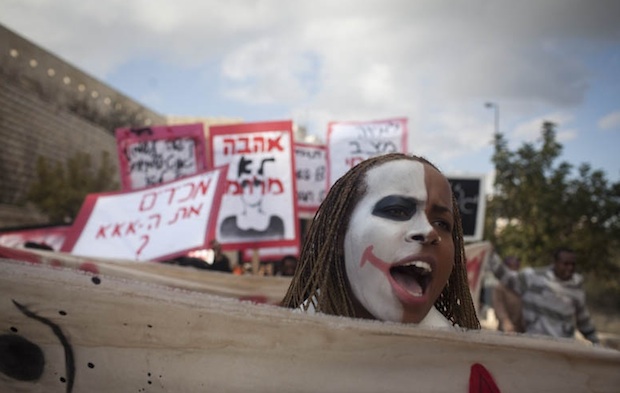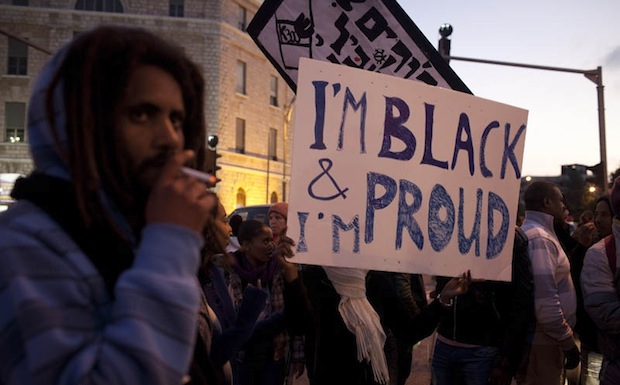For the young Ethiopians who began to speak up last week, the frustration is terrific. The test will come in the coming months as the young activists, like the summer protest leaders, try to figure out what comes next.
By Don Futterman
One week ago, a new generation of young Ethiopian Israelis made their voices heard for the first time when 5,000 citizens marched and rallied against racism in Jerusalem. The gathering was timed to coincide with the arrival of 26-year-old Mulet Araro as he wrapped up a three-day protest walk from Kiryat Malakhi to Israel’s capital, intersecting with Ehud Sagahun, walking from Netanya. Scores of young Ethiopian Israelis painted half or all of their faces in white makeup, a visual statement of their frustrated desire for social inclusion; to fit in, they feel they must be white, but they insist on remaining themselves, even at the cost of feeling half in and half out. The messages of the summer protest – the people demand social justice – were repeated but eclipsed by more specific calls. This generation of Ethiopians is not going to put up with the endless slights their parents endured; they want integration, not separation, and are tired of being being kept at arm’s length from full acceptance.

The outcry was triggered by a Channel 2 expose of an alleged secret agreement between several building committees in the southern town of Kiryat Malakhi, in which residents promised not to rent or sell their apartments to Ethiopians. Kiryat Malakhi is a tough town. First and second-generation Moroccan and Persian Jewish Israelis, who had endured plenty of prejudice from the Ashkenazi establishment in their day, absorbed the Ethiopian Jewish immigrants who displaced them at the bottom of the social ladder.
Viewers of Channel 2 were shocked to hear residents of this development town eschewing the lip service of tolerance, regurgitating instead the kind of slurs – they smell, they’re uncultured, they’re a bad influence, they’ll ruin the neighborhood – attached to foreign newcomers since time immemorial. Ethiopian immigrants have been here for more than 25 years, and prejudice against them has still not melted into memory. Their experience challenges the Zionist aspiration that the Jews be considered neither a race nor a religion but rather one people of many colors.
As in the summer protest, as in the Arab spring, a small cadre of young people used Facebook to get a surprisingly large number of angry and sympathetic citizens, including many non-Ethiopians, out to the streets. The demonstration, which followed a hometown rally attended almost exclusively by Ethiopians earlier in the week, was moving, well-planned, and organized in almost no time with practically no budget. Ethiopian Israelis might have been expected to share the summer protest demands for equitable housing, a lower cost of living and and welfare state benefits, and while there was a modest Ethiopian presence and a few NGO activists spoke from the podium, the community was underrepresented. But the Kiryat Malakhi incident seems to have snapped the Facebook generation out of its lethargy.

Their frustration surely had been fed by the story of another routine snub picked up by the press when another young Ethiopian – an army captain with a college degree – was turned away from a Tel Aviv nightclub. Both incidents crystallized the feeling that no matter how accomplished an Ethiopian becomes, he will be excluded from the “Israeli” club. Ethiopians had an extreme reaction to the Channel 2 report; the fact that a group of residents would go to the trouble of organizing and writing a contract to keep Ethiopians out was both galling and hurtful. The Kiryat Malakhi episode has already taken a prominent place in the pantheon of insults to the Ethiopian community, alongside the demand that they undergo conversion and the blood dumping scandal, when blood from Ethiopian donors was secretly disposed of for fear of AIDS contamination.
The public and the media were also appropriately outraged by this latest incident. The media suddenly found space for the Ethiopian experience, from a school bus driver insulting his young Ethiopian passengers, to the shortage of Amharic speaking social workers, to the resistance encountered by Ethiopian teachers looking for employment. The Knesset fired off a delegation for a photo-op in Kiryat Malakhi, promising to investigate charges of additional housing exclusions, proposing an anti-racism commission, and suddenly deciding that domestic murder within the Ethiopian community merited a discussion in Jerusalem.
Israelis become extremely defensive when accused of racism – given our history it’s easy to understand why – and the mean-spirited, small-minded prejudice of the words emanating from Kiryat Malakhi triggered revulsion. It was a far cry from the response last year when the Chief Rabbi of Tzfat, Shmuel Eliyahu, led 18 rabbis in calling for Jewish residents of his town not to rent apartments to Arabs. Rabbi Eliyahu was rebuked by Prime Minister Benjamin Netanyahu, and by numerous religious figures, but he was neither fired nor sanctioned.
The differences are telling. The bellwether of any democracy is how it treats its minorities. There is an omnipresent undercurrent of animosity and distrust toward Israeli Arabs, but some may argue that these feelings are more political than ethnic or racial.
But Ethiopians are supposed to be part of the Jewish collective, and in contrast to attitudes toward Palestinian citizens, there is genuine good will toward Ethiopian Jewry. The romance of the rediscovery of the long isolated Ethiopian Jewish community and the ingathering of these exiles still moves many in the Jewish world. For American Jews, who spearheaded the campaigns to bring Ethiopian Jewry back from “exile,” reuniting a black “long lost tribe” with the Jewish people was a redemption epic which should have invalidated any charge of Jewish racism, while offering a vicarious substitute for the frayed African-American-Jewish alliance of the civil rights years.
While Israeli Jews are more ambivalent about the Ethiopian immigrant community than they like to admit, in contrast to the attitude toward Arabs, there is a real desire to help Ethiopians. Countless Israeli individuals, NGOs and government agencies have reached out to Ethiopian newcomers. The government has far more capacity than it did when half a million early citizens tried to absorb a mass immigration twice their number 50 years ago. Unlike those early absorption efforts, vast resources have been invested in the Ethiopian community both from Israel and their American Jewish advocates.
Partly for those reasons, there is tremendous frustration with the difficulty of the process. Israel is supposed to be expert at absorbing Jewish immigrants, a belief which denies both the enormity of the challenge and the very mixed results of previous efforts. The track record is hardly stellar for the first generation of any immigrant group, including the much larger immigration from the former Soviet Union.
As the system fails on various fronts – education, employment, preventing domestic violence – the stigma has grown that Ethiopians cannot be educated or integrated into contemporary Israeli society. From my own experience with the successful program of the Israel Center for Educational Innovation to raise achievement levels in elementary schools with high concentrations of Ethiopian pupils, I can testify that this claim is nonsense, but that the establishment has vastly underestimated what it will take to achieve large-scale progress and has often applied its resources poorly.
The fact that Ethiopians are almost exclusively resettled in the poorest of urban neighborhoods reflects an astonishing lack of creativity and foresight. Why should it surprise anyone that the acculturation of an African villager into an Israeli slum will be profoundly traumatic, or that neighbors who may still be struggling (or failing) to hoist themselves up the social ladder will be less than welcoming? While it is not obvious what the alternatives are, tried-and-true failures ought to be abandoned.
At the same time, there is widespread ignorance and prejudice. Most Israelis know next to nothing about what life in Ethiopia was like and cannot appreciate the enormity of the cultural and technological gap that most of the immigrant community has had to leap over. When the waves of immigration from the 1950 and 1960 arrived, Israel was a country of small villages, even if its farmers were the backbone of the political elite and their culture was western. The Ethiopian immigrants, who largely came from mud and stick homes and lacking roads, plumbing or electricity, arrived just as Israel became a highly competitive high-tech superpower.
For the young Ethiopians who began to speak up last week, the frustration is terrific. Many grew up largely in Israel. They identify not as immigrants, but as Israelis, thinking and dreaming in Hebrew. Some had been separated from their parents and re-acculturated in Israeli boarding schools, or cherry-picked to take part in programs for high achievers. They stepped up to leadership positions in the IDF, and continued to excel in their academic studies and beyond. They have been celebrated and proven themselves when given the chance. Having tasted acceptance, they expect to be seen as Israelis and treated as equals.
If last week’s rally marked the convergence of Ethiopian grievances with the change-is-possible ethos of the summer protest, the test will come in the coming months as the young activists, like the summer protest leaders, try to figure out what comes next. They will need to join forces with Ethiopian NGOs – such as the Israel Association for Ethiopian Jewry, the Fidel Association, Tebeka, Olim Beyahad, and South Wing to Zion – who have been leading these struggles alone without much public backing. They need to develop the skills to lead and organize while they crystallize their demands. If they want this to be an Ethiopian winter, they will have to make sure their voices continue to be heard, and generate solutions on their own.
Don Futterman is a Program Director, Israel, for the Moriah Fund, a private American foundation which works to empower the Ethiopian community. He can be heard every week on the Promised Podcast, a discussion of new Israeli politics and society.
